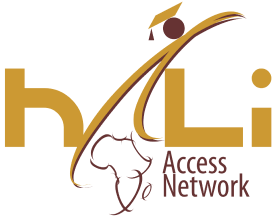Recently, a group of Friends of HALI collaborated to engage with HALI (high-achieving, low-income) students and access organizations in Kenya. This initiative was part of a broader outreach program organized by the Mastercard Foundation Scholars Program at USIU-Africa, which hosted three partner universities: the University of Pretoria, the University of Rwanda, and Ashesi University. These institutions aimed to create awareness about full-cost tertiary education scholarships available to high-achieving, low-income students under the Mastercard Foundation Scholars Program.
The outreach lasted five days, during which time they visited three different HALI organizations, including Shining Hope for Communities (SHOFCO), DARAJA, and Education For All Children (EFAC) and other schools and organizations in Kenya.
It was like a Valentine’s gift to us. We had the University of Pretoria, the University of Rwanda, Ashesi University, and USIU-A in the house! They interacted with over 100 of our scholars, including our refugee cohort.
At EFAC, students had the opportunity to engage directly with representatives from the four universities during panel discussions. These discussions provided a platform for students to ask questions and receive personalized guidance on the application process. The university representatives shared valuable insights not only about their respective institutions but also about the opportunities available through the HALI Access Network. This collaborative effort emphasized the importance of a support system and the power of collaboration within the network, highlighting the shared knowledge and resources among its members.
This collaborative effort ensures that we gain from the knowledge built around and among the network members. I do not need to know everything; I just need to know who is within the network. Thank you!
The highlight of the outreach program for students at EFAC was the 15-minute sessions they had with representatives from their preferred universities; it was like a “speed dating” experience.


These sessions allowed students to gather as much information as possible about their prospective universities. During these brief but focused interactions, students could ask questions, seek clarifications, and learn directly from the university representatives.
At SHOFCO, the outreach was an inspiration for the students. Often, scholarships can feel like distant dreams unattainable for HALI students. However, having university representatives engage directly with the students changed this perception, showing them that pursuing higher education is indeed possible. This interaction motivated the students to approach their applications with confidence and determination.
For the university representatives, participating in the outreach provided a firsthand experience of what it means to be a HALI student in Kenya. Walking through Kibera, the university representatives gained insight into the challenges these students face, including the financial obstacles that make applying for scholarships difficult. This experience deepened their understanding of our context and strengthened their advocacy for additional financial support, such as waiving application fees, to make higher education more accessible.
The outreach allowed the university reps to experience firsthand what it means to be a HALI student and how small application fees make it impossible to even apply for scholarships or to higher education institutions,
Additionally, the one-on-one, face-to-face interactions during the outreach allowed admissions representatives and counselors to build meaningful relationships, making it easier to address individual concerns and provide support, even after returning to virtual communication.
Collaboration during the outreach activities allowed the universities to exchange ideas and best practices in their recruitment and selection process. This knowledge exchange strengthened their outreach efforts and enhanced their understanding of Kenyan applicants’ unique challenges. The outreach not only benefited the partner universities and the HALI Organizations but also had a profound impact on the students and communities it reached.

One of our objectives as a network is to facilitate connections and build bridges to bring opportunities closer to the students who do not have access. Through collaboration, Friends and Members of HALI are living this aspiration and finding ways to support each other’s work and expand access. We celebrate this effort by MasterCard Foundation partner universities and other Friends of HALI who can visit access organizations and interact with their students to understand their context better.
